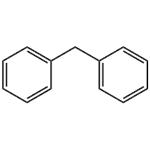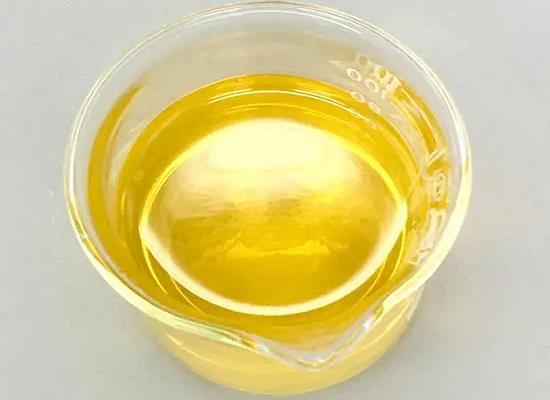Diphenylmethane Serves as an Efflux Pump Inhibitor in Drug-Resistant Escherichia coli
General Description
Diphenylmethane has been identified as a potential efflux pump inhibitor (EPI) that could enhance the activity of antibiotics against drug-resistant bacteria. In vitro studies have demonstrated that Diphenylmethane can modulate the activities of macrolides and fluoroquinolones against drug-resistant E. coli by reducing their IC50 values by two-fold at various concentrations. However, Diphenylmethane does not increase cell membrane permeability or significantly affect the post-antibiotic effect of erythromycin and clarithromycin. Additionally, the cytotoxicity test revealed a concentration-dependent decline in human hepatic HepG2 cell viability when exposed to Diphenylmethane, indicating the need for further research on its potential as a novel EPI.

Figure 1. Diphenylmethane
Diphenylmethane Modulates the Activities of Macrolides and Fluoroquinolones against Drug-Resistant E. coli
Drug-resistant bacteria present a significant threat to public health, and the development of new strategies to combat this issue is essential. In a previous study, it was found that alcoholic extracts of red seaweed Gracilaria sp. inhibited efflux pump activities in Escherichia coli (E. coli) overexpressing the efflux pump AcrB. Gas chromatography-mass spectrometry (GC-MS) was used to identify potential compounds responsible for this inhibition, and Diphenylmethane was identified as a candidate. Diphenylmethane was then evaluated for its ability to modulate the activities of macrolides and fluoroquinolones against drug-resistant E. coli in vitro. The results demonstrated that Diphenylmethane could reduce the IC50 of clarithromycin, erythromycin, and ciprofloxacin by two-fold at various concentrations. These findings suggest that Diphenylmethane has the potential to be used as an efflux pump inhibitor (EPI) to enhance the efficacy of antibiotics against drug-resistant bacteria. Moreover, the modulation activities of different EPIs for various antibiotics could vary significantly. Therefore, further research is warranted to explore the potential of Diphenylmethane as a novel EPI to combat drug-resistant bacterial infections. 1
The Effect on Membrane Permeability and Post-Antibiotic Effect
The cell membrane is vital for maintaining cell viability and facilitating essential cellular processes. Increased membrane permeability can disrupt proton motive force and intracellular pH homeostasis. This allowed propidium iodide to compete with SYTO9 for DNA binding. Interestingly, the addition of Diphenylmethane did not reduce SYTO9 fluorescence, indicating that Diphenylmethane does not increase cell membrane permeability. Efflux pump inhibitors should not disrupt the cytoplasmic membrane potential, an energy source for the pump. Some effective EPIs destabilize the bacterial membrane but have limited use due to cellular toxicity. For example, CCCP inhibits efflux pumps like E. coli AcrB by interfering with the proton motive force but has restricted use due to toxicity. The post-antibiotic effect refers to continued suppression of bacterial growth after antibiotic exposure. The researchers evaluated the PAE of erythromycin and clarithromycin on Kam3-AcrB. The addition of Diphenylmethane did not significantly affect the PAE values of these antibiotics, suggesting that Diphenylmethane does not substantially impact their post-antibiotic effects. In conclusion, Diphenylmethane does not increase cell membrane permeability or significantly affect the post-antibiotic effect of erythromycin and clarithromycin. Further research is needed to explore the potential of EPIs in extending the PAE of antibiotics against gram-negative bacteria, as this area has been under-studied. Additionally, Diphenylmethane demonstrated high cell viability in human hepatic HepG2 cells at tested concentrations. 2
Cytotoxicity Test
The cytotoxicity test was conducted to assess the impact of the efflux pump inhibitor (EPI) Diphenylmethane on the viability of human hepatic HepG2 cells at different concentrations. This results showed that at a concentration of 15.6 µg/mL, Diphenylmethane maintained 95.6% ± 4.0% cell viability. However, as the Diphenylmethane concentration increased, cell viability gradually decreased, with an IC50 value exceeding 250 µg/mL. Previous data indicated that Diphenylmethane, when present at concentrations below 250 µg/mL, could potentially enhance the activity of antibiotics by interfering with Kam3-AcrB drug efflux. Studies have also demonstrated the effectiveness of piperine, an alkaloid EPI, in reducing the minimum inhibitory concentration (MIC) of antibiotics. For instance, piperine at 12.5 µg/mL decreased the MIC of ciprofloxacin twofold, and at 32 µg/mL, it reduced the MIC of ethidium bromide twofold against Mycobacterium smegmatis. Furthermore, exposure of human Hela cells to varying piperine concentrations led to decreased cell viability compared to untreated cells. In summary, the cytotoxicity test revealed a concentration-dependent decline in cell viability of human hepatic HepG2 cells when exposed to Diphenylmethane. 3
Reference
1. Poole K. Efflux-mediated antimicrobial resistance. J. Antimicrob. Chemother. 2005, 56, 20–51.
2. Lamut A, Masic L, Kikelj D, Tomasic T. Efflux pump inhibitors of clinically relevant multidrug resistant bacteria. Med. Res. Rev. 2019, 39, 2460–2504.
3. Lu WJ, Hsu PH, Chang CJ, et al. Identified Seaweed Compound Diphenylmethane Serves as an Efflux Pump Inhibitor in Drug-Resistant Escherichia coli. Antibiotics (Basel). 2021, 10, 1378.
);You may like
Related articles And Qustion
See also
Lastest Price from Diphenylmethane manufacturers

US $50.00-1.00/KG2024-03-25
- CAS:
- 101-81-5
- Min. Order:
- 1KG
- Purity:
- 99%
- Supply Ability:
- g-kg-tons, free sample is available

US $0.00-0.00/kg2023-12-18
- CAS:
- 101-81-5
- Min. Order:
- 1kg
- Purity:
- 0.99
- Supply Ability:
- 50000kg




